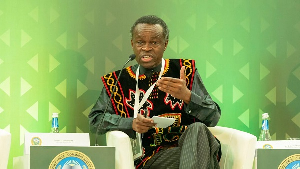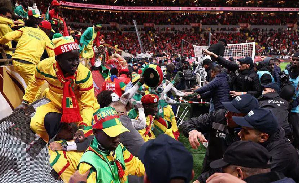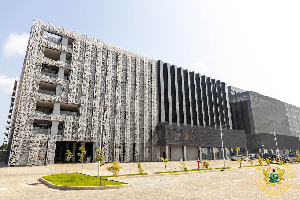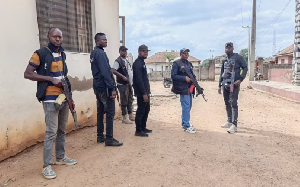How do we keep the legacy of Mandel alive? How do we ensure his enemies do not taint his legacy? Which cultural domain does Mandela belong? Does Mandela belong in the West, the world, or Africa? Was Mandela a Pan-Africanist? Inarguably, we strongly believe he belongs to the world, though, understandably, the moral and spiritual core of his cultural personality is quintessentially African and, therefore, emotionally makes him a suitable candidate for Africa. Possibly, the coming future is bound to see another sweltering culture war in which the legacy of Mandela is strewed between opposing ideologies, Eurocentrism and Afrocentricity.
But how do we specifically define the problem, that is, the cultural context for evaluating Mandela’s legacy? Before we attempt answers, let’s first put things in perspective: “The CIA and NSA spy services—with the full collaboration of such transnational corporations as IBM, Kodak and many others—worked at all levels and for decades for Apartheid and against the African National Congress activists who were murdered, tortured and sentenced to life terms in the hell holes of South Africa,” writes Brian Becker in his provocative article “Crocodile Tears: It Was The CIA That Helped Jail Nelson Mandela.” This fact is widely known but that’s beside the point.
In effect, Becker’s candid observation should define the moral backdrop against which to weigh serious answers to the afore-cited questions in the first paragraph. In other words, Becker’s revelation is exactly where the discourse on moral questions pertaining to the cultural, spiritual, and intellectual allocation of Mandela in human history should begin! Indeed, didn’t Ronald Reagan and the American government declare Mandela (and the ANC)—right through his presidency—a terrorist until 2008 when the latter saw good reasons to void the negative political and legal implications redounding to Mandela’s noble personality?
Surprisingly or not so surprisingly, didn’t Ronald Reagan, a cowboy president, declare Jonas Savimbi a freedom fighter? In the realm of political Eurocentrism, is there a moral delineation between Mandela, a lover of humanity, as a “terrorist,” and Jonas Savimbi, a misanthrope, as a “freedom fighter”? Could the West have forgiven Osama bin Laden as Mandela unconditionally forgave the West? Who has moral power over formulations of social and political definitions, the Eurocentrist or Afrocentrist? Didn’t the white Nationalist government of Apartheid South allegedly infect Mandela with tuberculosis in a calculated attempt to kill him slowly in prison?
Hasn’t Ayi Kwei Armah meticulously detailed for us how America set up Mandela for his arrest, for his trial, and for his imprisonment? Then again, why did White South Africa, led by the notorious white supremacist Mike du Toit, attempt to assassinate Mandela and to drive Black South Africa away to Zimbabwe? Moreover, given the undeniable facts about America’s shady role in Mandela’s arrest, trial, and imprisonment, it’s no wonder that Ayi Kwei Armah has questioned the hypocritical haste with which the West made a volte-face in repairing the image of Mandela after years of portraying him (and the ANC) in a negative light. Actually, the virtual absence of auctorial circumambage on the part of Armah’s literariness is so impressive as for Africa to fail to see the moral sinews lingering behind his logical reasoning. Therefore, there is no excuse for ambiguous actualization as far as reclaiming Mandela for Africa is concerned!
Then, realizing that the inoculation shot of feigned innocence has not yet fully undone collective Western guilt, Armah, again, tactically, went after the West, expressing his eagled-eye surprise at its sanctimonious attempt to make Mandela, a reformed terrorist, a Western cultural icon and commercial item—when the great man and his legacy are global phenomena, are yet to be defined and extensively evaluated, and when, predictably, they defy the absolutistic strictures of Eurocentric particularism. This is why we cannot simply allow Eurocentrism to box Mandela into a rivulet of self-serving cultural particularity in favor of and by the West.
In fact, the celebrated phenomenon of Mandela is as nebulously global as it is quintessentially African; namely, it defies simplistic categorization, as pointed earlier! Inferentially, though, Armah wants us to reclaim Mandela and his legacy for Africa. This is a huge task Armah has imposed on the African world. Even so, Walter Isaacson, biographer of Steve Jobs, Albert Einstein, Benjamin Franklin, and Henry Kissinger has recently spoken highly of Mandela, assessing the elevated potential of his leadership profile in terms of cultural particularities, where, for instance, individualism, rather that community, drives the engine of political leadership. Here, too, Eurocentrism and Afrocentrism collide on the ideological minefield of definitional politics. However, it does seem Eurocentrism has no interest in addressing the question of political leadership in moralistic terms.
Technically, in our case, Mandela was a community, not an individual. The Sharpeville Massacre, the Soweto Uprising, the Bisho Massacre, the Soviet Union, the ANC, Kaddafi and Libya, Fidel Castro and Cuba, China, Oliver Tambo, Walter Sisulu, Steve Biko, Africa, and millions of South African women—constitute the activist community we aptly refer to as Mandela. For instance, Mandela had this to say: “I have also invited Gaddafi to this country [South Africa]. And I do that because our moral authority dictates that we should not abandon those who helped us in the darkest hour of this country. Not only did they [Libya] support us in return, they gave us the resources for us to conduct our struggle, and to win. And those South Africans who have berated me, for being loyal to our friends, literally they can go and throw themselves into a pool,” writes Forte.
Namely, Mandela saw himself and the struggle for liberation strictly in terms of community. On the other hand, the leadership individualism of a Kissinger or a Franklin, say, is culturally Eurocentric. Since cultural individualism is of Eurocentrism and unAfrican, since cultural Eurocentrism stands in sharp contradistinction to Afrocentricity, Mandela should be defined by the community of his people, their continued suffering, successes and failures, his activist peers, the world, history, and circumstance—his self-less struggles on behalf of the downtrodden. This task is essentially Africa’s, not the West’s. In truth, the West lacks the moral high ground, cultural vocabulary, African essentialism, and spiritual psychology, and, therefore, we believe, it cannot equitably evaluate the legacy of Mandela on behalf of Africa. Brian Becker and Ayi Kwei Armah have made that eloquently clear.
We can also say with authority that Mandela fought not only for Black South Africa but for Indians, Coloreds, Jews, Asians, and whites as well. However, we also believe, in hindsight, that there is a better reason, rather than the State Department’s “bureaucratic snafu,” for the continued retention of Mandela’s status as a terrorist well into 2008. We offer this controversial theory: To keep Mandela in check just in case he finally changed his mind to sink Western economic interest in the stinking mud of collective retaliation on behalf of his wronged brothers and sisters or to drive White South Africa into either the Indian Ocean or Atlantic Ocean. Having said that, we equally believe the West underestimated the unfathomable depths of honesty which this great son of Africa consistently demonstrated to the world.
The great man was simply as honest as his promises on reconciliation and forgiveness. And if our theory is wrong, why did he remain a terrorist even after the United States had established cordial relations with his government? Could it have been the usual Machiavellian politics which white folks play with black folks? If not, why did Ronald Reagan honor Martin Luther King, Jr., a dead man, with a national holiday, while, he, unfortunately, branded Mandela, a living man, a terrorist? Mandela transcended the cultural particularity of white politics. Indeed, Mandela rose from the spiritual and moral fire of the African masses, lived among the African masses, dined with the African masses, cried with and fought for racial justice on behalf of the African masses, acquired political and cultural wisdom from the African masses, and, finally, passed on and got buried among the African masses, ancestral and living.
Why, then, must he be someone else’s, outside Africa? In other words, the living Mandela and ancestral Mandela, as we said before, are culturally, spiritually, intellectually, and morally African—quintessentially. Already, David James Smith’s unauthorized biography of Mandela, “Young Mandela: The Revolutionary Years,” deconstructs the moral iconography of Mandela, a somewhat lame intellectual exercise realized via Eurocentric prose of sexual commercialism, hollow anecdotes, and sensational gossip. It’s more like a conflation of fictional and historical biographies, but, in reality, Smith’s attempt to evaluate the moral, intellectual, and political personality of Mandela amounts to an anorexic skeleton of commercial Hollywoodism—nothing more than tabloid biography or journalism. Nelson Mandela, again, is more than that.
Nevertheless, we are neither asking for a hagiography nor a sanitization of his legacy when authenticated facts say otherwise. Neither can rock stars like U2’s Bono nor Bill Clinton tell Mandela’s story. That said, let’s also quickly add that Dambisa Moyo’s contrarian position on Bono and his well-publicized philanthropy is eloquently emotionless. She believes, and, rightly so, that Bono’s well-intentioned attempts to raise the global profile of Africa’s ostensible “impoverishment,” via his social and political biography of philanthropy, is, developmentally, socially, and economically counterintuitive in the African context. In other words, she thinks Bono’s philanthropic style of telling the story of social conditions in Africa does damage the image of Africa—in a very serious way—in the international community.
Africa, she theorizes, needs self-empowerment, an idea based on conditionalities of self-development, of total independence, as well as of a distancing of Africa from the pitying circularity of Western paternalism and patronage—foreign aid—to drive Africa’s moral engine of self-definition, this, as far as African development economics and lifting the masses out of the abysmal cesspool of poverty are concerned. Underlying her Afrocentric economics is her firm, pragmatic belief in Africa’s potential for self-improvement. She does not see the West or Asia as necessarily intellectually superior to Africa. In this context, therefore, her unromantic definition of storytelling is profound. This Afrocentric path to storytelling we must follow.
We need an objective evaluation of Mandela and his legacy. Chimamanda Adichie’s “The Danger of a Single Story” underscores our case for biographic objectivity. Those who shamelessly branded him a terrorist while he was alive cannot simply turn around and say with moral certainty if he should be ranked a world-class leader of high moral standing in death. In other words, those who have consistently demonstrated a lack of moral and political fortitude to openly declare the Ku Klux Klan a terrorist organization cannot undertake an evenhanded appraisal of Mandela. Mandela is, therefore, our story to tell the rest of the world.
As a good example, Pennington’s and Berndsen’s “Africa The Good News,” a well-rounded survey of social, political, and economic positives in Africa, is such an objective biography of Africa. The era where things African are totally couched in Eurocentric negativities is past and gone, far gone. In fact, Mandela’s one of the many successful African stories to bring to the world’s attention. We cannot afford to let this golden opportunity pass us by. Consequently, it’s not a stretch of the imagination to assert that, today, Africa, has, without a doubt, come of age to begin to tell her own story. We need to confidently live our story as well as everyone else does, for respectability and power both accompany the telling of one’s story.
That power has an economic dimension to it and defines the station of a group, nationality, ethnicity, or race in human relations. We, therefore, need to take complete charge of Mandela and his legacy before the West does. This is why Mandela is going to be buried in Africa, not in the West. Long live Africa and long live the family of Rolihlahla Nelson Mandela.
We shall return…
Opinions of Saturday, 14 December 2013
Columnist: Kwarteng, Francis














